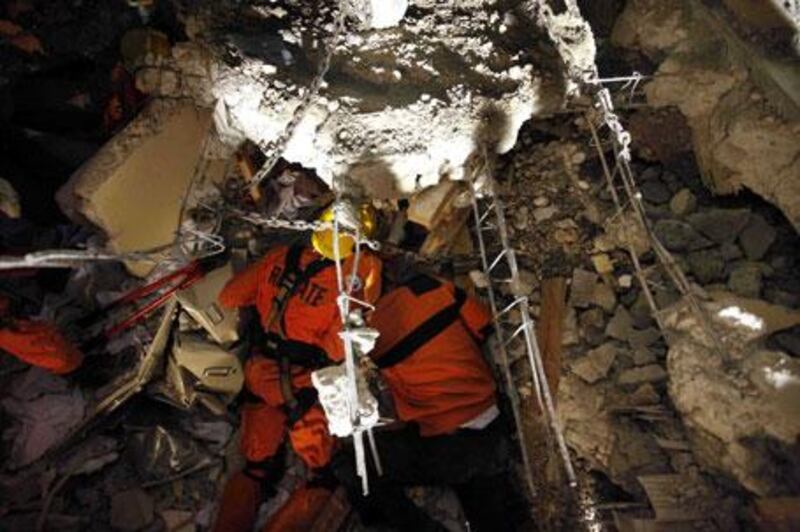PORT-AU-PRINCE // Driving through the rubble left from this week's earthquake in Haiti's capital with Noel Myford, a lifelong resident of the city, rapidly becomes a repetitive exercise illustrating the scale of this disaster. "This one was a five-storey building," says the 24-year-old, pointing to a lopsided supermarket poised to collapse further still. "This one here was four storeys high. This was a school - there were children inside when it came down and six were killed."
The streets of Port-au-Prince were bustling with people yesterday, many now left homeless from the 7.0-magnitude quake that tore through this impoverished city on Tuesday afternoon, scouring collapsed buildings for their loved ones. As rescue teams scour the wreckage, groups of young Haitian men pull twisted steel and concrete blocks as passersby gaze on, strolling and dodging the overhanging telegraph poles and dead bodies lying in the street.
Mini-shanty towns of wooden poles and plastic sheeting have sprung up in vacant lots, with those left homeless forced to spread out their limited resources, having to pay as much as US$0.20 cents (Dh0.7) for a small bag of drinkable water. Those queuing outside petrol stations for hours before being served are also paying exhorbitant rates, with hawkers, taxi drivers and other vendors making large profits from scarce commodities.
Others seek to capitalise on the disaster in other ways, leafing through the documents that spilt out onto the street from a collapsed bank, or pulling themselves through the wreckage of a mobile phone store looking to nab handsets. Mr Myford, who "thanks God for his luck" in not being buried under the rubble of the cyber cafe he staffs, described the stench from over-spilling morgues and queues outside hospitals refusing any more admissions.
"The people are co-operating, they are working together. They are climbing on rooftops and looking for people inside the buildings, looking for people from the friends and family," he said. "They don't care about their buildings or what they've lost - they only care about their lives." The mammoth task of delivering emergency food, water and fuel supplies to the impoverished people of Haiti also began in earnest yesterday in the aftermath of a massive earthquake that officials say could have left more than 100,000 dead.
As cargo jets unloaded crates onto the tarmac of Port-au-Prince's main airport, aid workers and rescue teams from donors such as the United States joined forces with one-man charity outfits, united in a struggle to prevent Haiti from sinking deeper into instability. Among them was Brent Gambrell, 44, a minister from Nashville, Tennessee, who flew out yesterday to help the 70 orphans left homeless by Tuesday's 7.0-magnitude temblor when their home, the New Life Link, collapsed.
"Everyone else seems to be trying to get out of this place, but we've been trying to get in," said the 44-year-old. "There are 70 babies that slept out in the street last night and are running out of food and water - that's why I'm here." Mr Gambrell said the orphanage was sited in Carrefour, close to the epicentre of the powerful tremors that ripped through a densely-populated area 15km south-west of the city centre, destroying the first floor of the four-storey block.
Orphanage staff managed to evacuate all their charges, but badly need the minister and his colleagues who, armed with cash, plan to buy the supplies that will keep the children, aged between birth and six, alive. As the American was liaising with colleagues in the airport terminal - a thronging aid hub with heaped rubble and cracked walls bearing testament to the power of the earthquake - wealthy Haitians formed queues to exit the city.
Her arm in a sling after a supermarket wall collapsed on her during a series of temblors beginning at 4:53pm on Tuesday, Pascale Theard, was waiting for a flight to evacuate her family to the neighbouring Dominican Rebublic. "I've got to get my two daughters out of here," said the fashion clothing designer. "There are people sleeping outside in the streets and everyone is running out of food and water. It is only a matter of time before they get angry."
Ms Theard said she was only one of a handful of people to make it out of the Caribbean supermarket in the Delmas area, spending hours crawling through the rubble that had buried her and clambering over the bodies of unlucky shoppers. She is not the only one expressing concern over the pace of aid deliveries, with supplies dwindling and the memories of the Western hemisphere's poorest nation repeatedly teetering on the brink of gang violence and anarchy in recent decades.
jreinl@thenational.ae







